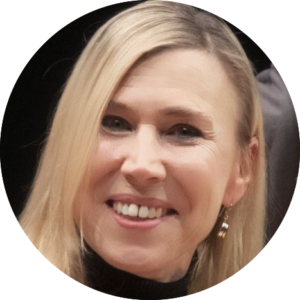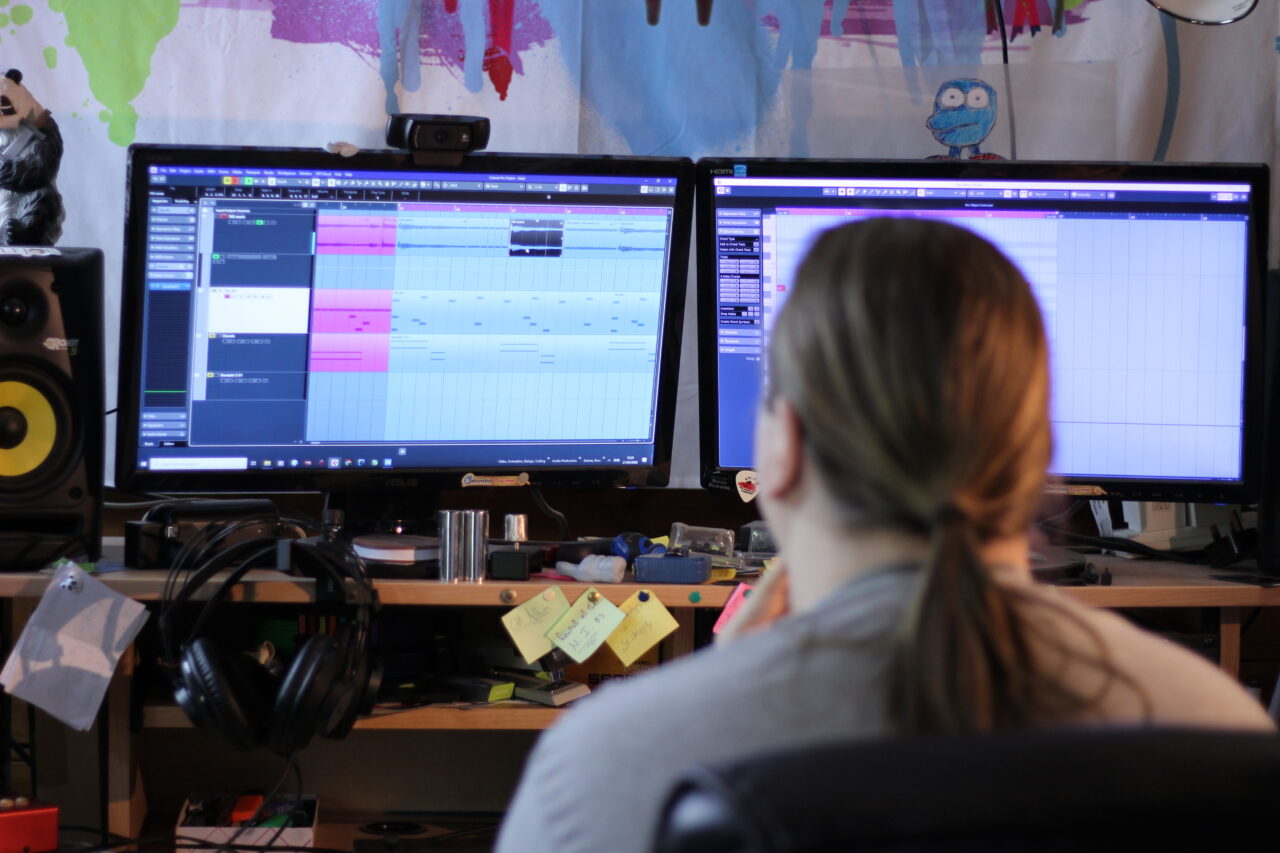-
Jul 23 2021 Technology in Music Education
Welcoming TiME to the Take it away Consortium
We’re thrilled that TiME: Technology in Music Education has joined the Take it away Consortium, a group of leading UK music organisations that are looking at ways of making music inclusive and accessible to all.
We sat down with Kate Rounding, Development Director at TiME, to learn more about the organisation’s beginnings, why access to music-making is important to them and more!
How did TiME come about?
TiME is an alliance of music industry organisations, formed to raise awareness of the great potential of Sound and Music Technology across all the Arts and in the community. It was formed by David Ward and Richard Llewellyn as a community interest company (CIC) in 2019 with the aim of providing educators with the skills, knowledge and tools needed to support students and emerging professionals.
We connect music industry professionals, music educators, the informal music education sector and professionals in the Special Needs and Disabilities (SEN/D) areas. Together we focus on actions to enhance and promote the value of music technology to the economy, the music industry, and in education.
TiME is also affiliated with its sister organisation ‘Joint Audio Music Education Support’ (JAMES), the recognised Public Sector Regulatory Body (PSRB) for the Recording, Music Production and Media industries. We thus engage with many Universities and their students.
 Our job in TiME is to break down the barriers to exploring the great potential of music technology and to bring communities, organisations and opinion formers together to raise awareness of this potential.
Our job in TiME is to break down the barriers to exploring the great potential of music technology and to bring communities, organisations and opinion formers together to raise awareness of this potential.
How do you work with schools and hubs across the country?
TiME connects with music hubs and music educators from Early Years, all the way to University level across the UK. Through our work, we support hubs to make direct connections with other organisations, education establishments and teachers to aid the development of their inclusive music provision through the use of music technology.
Our recent series of online conferences ‘Connectivity’ was hosted in partnership with Leicester Music Education Hub and UK Music and facilitated discussions between over 30 different organisations and over 100 music and education professionals, providing insight into topics such as how technology can support equitable access to music-making for SEN/D learners and information on the range of careers available across the music industry.
You can catch up on the wide range of discussions we had in each session here: techmusiced.org.uk/page-2/connectivity.php
How would you like to see music education change in the next 10 years?
It is more important than ever to support music education in all its forms, whether that is within schools, music hubs or across the community. The potential of SOUND and music technology is huge in all aspects of music-making across all ages, genders, cultures. It is invaluable in all aspects of education, community groups, hubs, music therapy and all areas of special needs and disabilities. It encourages getting involved with making music, composition, recording and music production film and media, artistic installations, everywhere that we see and hear music in life. We can use Music Technology to teach STEM subjects.
Our job in TiME is to break down the barriers to exploring the great potential of music technology and to bring communities, organisations and opinion formers together to raise awareness of this potential.
Why is accessibility and inclusions to music-making important to you?
There is a wealth of evidence that demonstrates the benefits of music-making. We believe that everyone has a right to access music-making and that music technology can support inclusive music-making approaches that are accessible to all. In addition, new technologies are evolving rapidly and at TiME we work with manufacturers to deliver an ‘Accessibility’ Testing programme, where manufacturers can connect with musicians and educators in a range of settings to learn about how their new technology can be used to support inclusive and accessible music-making.
Personal and lived experience of disability amongst our team has provided a direct insight into the benefits (and barriers) to music-making. We are committed to supporting organisations and individuals to continue striving for equal and equitable access for all.
What can people do to get involved or find out more?
Please visit www.techmusiced.org.uk or contact us at info@techmusiced.org.uk
Stay up to date by following TiME below:
-
Jun 24 2021 Learning by Livestream
Learning by Livestream
Based in Cambridge, Liam Taylor has been making music non-stop in some form for the last 17 years. He works across different areas of music from education to running a music blog, composing for independent film and releasing his own original music. This year, Liam became a Steinberg Certified Trainer and has gained recognition for his Cubase tutorial type livestream sessions.
We caught up with Liam to find out more about his approach to learning how to produce music and to get some advice for anyone looking to get started in this side of music-making.
What led you to start creating your livestream music production sessions?
I started creating videos for YouTube 10 years ago. For a while, I was creating weekly videos teaching composition or guitar techniques, sharing ideas and sometimes releasing new music. This was a great way to build a community but also gave me a way to discover new ideas myself – they say the best way to learn is to teach.
Trying to keep on top of this weekly schedule became tricky after a while. I found that I was prioritising video creation over writing music which didn’t make any sense to me. So, I started to look for ways to stay in touch with my audience that didn’t require several days of research, recording and editing every week. I realised that live streaming could be the answer.
I decided to go live twice a week and make music in Cubase with no goals other than to be creative. This gave me a reliable 4 hours of music creation every week with very little preparation. It also allowed me to chat with the audience live, so it was absolutely the right call.

I find being this open with my creative process really helps viewers see how music is really created; in an imperfect, non-linear way with plenty of mistakes!
Describe your sessions – what can viewers expect to happen and learn?
The goal is almost always to write a new piece of music from scratch. I recently added a keyboard camera to the setup to show exactly what I’m playing and talk through the notes or chords I’m using. As I write the different parts, I describe the decisions I’m making, sometimes throwing decisions to the audience. Sometimes the audience will insist I change a patch or a chord which I don’t mind!
Once the basic structure of a song is in place, I’ll start adding production elements like E.Q., dynamic plugins, etc. Depending on the type of song I’m working on, I might add electric guitar, bass or ukulele – I have a room full of instruments so it’s nice to make use of them.

What’s the benefit of livestreaming compared to pre-recorded videos in your opinion?
Because I talk through all the decision making, viewers can use any of the production or composition techniques in their own work. I find being this open with my creative process really helps viewers see how music is really created; in an imperfect, non-linear way with plenty of mistakes! It’s exactly the kind of thing I would have watched when I was a teenager, (and exactly the kind of thing I do watch whenever I can!)
Occasionally, I’ll run a stream where I look back over old project files to add some variety. It’s really funny to look back at decisions I made 5+ years ago and wonder “what was I thinking!?” Sometimes it’s similar to working with younger music producers because some simple fixes can make the whole piece work better. Rather than working with a younger producer, I’m working with a younger version of myself so I’m pretty comfortable calling out whatever silly decisions I made back then.
These sessions go out on YouTube and Twitch (both free platforms) so anyone with either account can watch and interact. I welcome any audience questions, whether or not it’s relevant to the stream’s topic. I have some big ideas about where to take these broadcasts in the future – I think there’s potential for this to be a great resource for all music students.
What advice or tips would you give to someone looking to start learning from scratch?
A lot of creative projects can look really daunting from the outside. You don’t necessarily need any prior knowledge to start making music so I’d suggest that anyone interested should just jump in!
Try to turn off the part of your brain that tells you you’ll fail, because of course you will, but you have to embrace failure as part of the process.
I’d recommend starting by making a BandLab account – it’s a free, web-based program with plenty of tutorials and resources to help you get started. You’re likely to outgrow it at some point, but you’ll learn a lot in the meantime and the benefit is that you won’t have to spend any money up-front.
What do you think the biggest barriers are that stop young people from getting involved in music-making?
I believe there are two main issues. Firstly, information overload. It’s hard to know where to begin, especially as there are so many different programmes and so many ways to approach music-making. What works for you might not work for someone else and, unfortunately, you don’t always know that until you try it.
Secondly, confidence. As a kid, when you think of making music you probably start by thinking of someone incredibly famous who tours the world and is all over social media. When I was a teenager, I thought that all musicians could sight-read. I assumed that anyone playing music on TV had a Grade 8 and had spent years studying music history. Eventually, I realized that wasn’t true. In fact, all I needed was a guitar, Cubase and the confidence to trust my intuition.
Why do you think it’s important to learn about music production?
Whatever your long-term goals are with music, understanding the production side of things and knowing the basics of a digital audio workstation (DAW) will be beneficial. If you’re interested in music creation but you treat it as a hobby, making beats or recording yourself with a DAW is a really fulfilling way to explore your creativity.
If you want to be a performer of some kind, knowing how to record basic demos or backing tracks will be incredibly useful to convey your artistic vision to other producers, or a record label, (if that’s the route you want to take). If you’re dedicated enough, you may be able to self-produce your work at every stage of your career.
There are also plenty of careers that rely on music tech: commercial music and client work; studio production and engineering; composition for film, TV and games. Being familiar with a DAW and some standard production techniques is a great start for anyone considering these careers.
How can people get involved in your sessions and stay in touch?
There’s a page on my website with a Livestream calendar and further info. You’re welcome to explore the site for more information about me and my music projects: ltguitarist.com/streaming
I’m @LTGuitarist on all the socials and most active on Twitter if you have any questions.
Stay up to date and tune into Liam’s livestreams by clicking on the icons below:
-
May 20 2021 6 Pieces of Studio Gear to get started as a Producer/ DJ – Point Blank
Point Blank Beginner Kit List: 6 Pieces of Studio Gear for Producers/DJs
Point Blank Music School pride themselves on helping young creatives kick-start their music careers. With over 25-years of offering award-winning music courses both at their HQ’s in London and Los Angeles, as well as online, they are clued up when it comes to the kind of music tech you should have in your home studio. If you’re new to the world of music production and/or DJing and need to get to grips with what software and hardware you need, they can help!
They’ve put together their six go-to pieces of kit for anyone looking to jump into the world of music creation and performance which you’ll find below.
If you’d like to learn more about music production, DJing, singing, songwriting and music business, be sure to check out Point Blank’s courses. Plus, they’re currently offering 25% off their selected London, Online and Los Angeles courses using the codes LONDON25, ONLINE25 and LA25.
1. Ableton Live
Ableton Live is a staple for many music producers, featuring a range of instruments and effects. There are some affordable price plans available if you’re not looking to buy upfront as well as the option to grab yourself a copy for free when enrolling on certain Point Blank courses. If you’re looking for some fantastic free plugins to add to your music production tool kit, check out Point Blank’s round-up of the 10 Best Free Plugins: 2021.
2. AKAI Professional MPK Mini MKII
Akai’s MPK Mini MKII is a great controller for programming beats and playing in your basslines and melodies. Unlike many other controllers, the MKII has an innovative 4-way thumbstick for dynamic pitch and modulation control as well as a built-in arpeggiator with adjustable modes. This one’s perfect for taking on the road due to its compact size of 18 x 31.4 cm (that’s roughly the size of a laptop).

3. Focusrite Scarlett Solo
To help connect all your gear, you’ll need a good audio interface. Focusrite’s Scarlett Solo is perfect for beginners and features an XLR input for recording vocals or instruments, the best-sounding Scarlett mix preamp yet, a 2-in/2-out configuration and more.

4. KRK ROKIT RP5 G4 Studio Monitors
What’s great about the KRK ROKIT RP5 G4 monitors is their integration with the KRK app. This allows users to gain expert assistance with EQ, level matching, speaker placement and more, so you’ll get the most out of your monitors. KRK’s are popular in lots of home studios thanks to their reliable quality and accessible prices. As well as featuring powerful D-class amplifiers, their custom Brickwall Limiter helps provide wider sound dynamics and prevents them from overheating.
5. beyerdynamic DT 770 PRO
These beyerdynamics are a solid option for those looking to use their new headphones primarily at the studio. They’re bass-heavy, reasonably priced and durable, meaning that you won’t need to replace them anytime soon. You’ll reap the benefits of these headphones when using an audio interface but when plugged into a laptop or phone the sound can feel slightly less driven. Overall these are a great selection if you’re in the game for some low-end studio sessions.

6. Pioneer DJ DDJ-400
The DDJ-400 from Pioneer DJ comes in at just under £250, making it a fantastic entry-level controller for those looking to jump into the world of DJing. Like many of Pioneer DJ’s other hardware controllers, the DDJ-400 comes equipped with the latest Rekordbox software which enables users to set cue points, hot cues, arrange playlists and organise their tracks for use on CDJs when the time comes. The layout on this controller mirrors that of the performance tech giant’s flagship NXS2 set-up, meaning that it’s a great tool to use when preparing yourself for the club.

If you’re looking to kick-start your music career, be sure to check out Point Blank’s award-winning courses in London, Los Angeles and Online: www.pointblankmusicschool.com

How Take it away can help you
Instruments and equipment can be expensive meaning some people never discover the joy of learning and playing music.
At Take it away, we work with our retail partners, Arts Council England and the Arts Council of Northern Ireland to break down these barriers. A part of Creative United, a community interest company that drives economic growth and social impact in the arts and creative industries, we provide a range of subsidised and non-subsidised loans. These are designed to make learning, playing and participating in music more affordable and open to everyone.
Together with our partners, we look to enable and inspire a life-long love of music.
Find out how Take it away can help you with the cost of a musical instrument, equipment and software.







